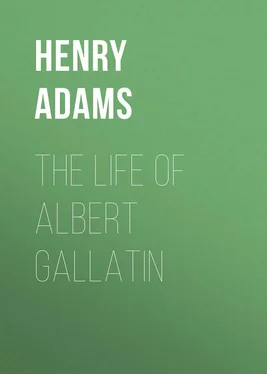Henry Adams - The Life of Albert Gallatin
Здесь есть возможность читать онлайн «Henry Adams - The Life of Albert Gallatin» — ознакомительный отрывок электронной книги совершенно бесплатно, а после прочтения отрывка купить полную версию. В некоторых случаях можно слушать аудио, скачать через торрент в формате fb2 и присутствует краткое содержание. Жанр: foreign_antique, foreign_prose, на английском языке. Описание произведения, (предисловие) а так же отзывы посетителей доступны на портале библиотеки ЛибКат.
- Название:The Life of Albert Gallatin
- Автор:
- Жанр:
- Год:неизвестен
- ISBN:нет данных
- Рейтинг книги:4 / 5. Голосов: 1
-
Избранное:Добавить в избранное
- Отзывы:
-
Ваша оценка:
- 80
- 1
- 2
- 3
- 4
- 5
The Life of Albert Gallatin: краткое содержание, описание и аннотация
Предлагаем к чтению аннотацию, описание, краткое содержание или предисловие (зависит от того, что написал сам автор книги «The Life of Albert Gallatin»). Если вы не нашли необходимую информацию о книге — напишите в комментариях, мы постараемся отыскать её.
The Life of Albert Gallatin — читать онлайн ознакомительный отрывок
Ниже представлен текст книги, разбитый по страницам. Система сохранения места последней прочитанной страницы, позволяет с удобством читать онлайн бесплатно книгу «The Life of Albert Gallatin», без необходимости каждый раз заново искать на чём Вы остановились. Поставьте закладку, и сможете в любой момент перейти на страницу, на которой закончили чтение.
Интервал:
Закладка:
“J’ai baisé ce portrait charmant,
Je vous l’avourai sans mystère.
Mes filles en out fait autant,
Mais c’est un secret qu’il faut taire.
Vous trouverez bon qu’une mère
Vous parle un peu plus hardiment;
Et vous verrez qu’également
En tous les temps vous savez plaire.” 2 2 Printed in Voltaire’s Works, xii. 371 (ed. 1819.)
The success of Mme. Gallatin in the matter of figs led Voltaire to beg of her some trees; but his fortune was not so good as hers.
“10e Auguste, 1768, à Ferney. Vous êtes bénie de Dieu, madame. Il y a six ans que je plante des figuiers, et pas un ne réussit. Ce serait bien là le cas de sécher mes figuiers. Mais si j’avais des miracles à faire, ce ne serait pas celui-là. Je me borne à vous remercier, madame. Je crois qu’il n’y a que les vieux figuiers qui donnent. La vieillesse est encore bonne à quelque chose. J’ai comme vous des chevaux de trente ans; c’est ce qui fait que je les aime; il n’y a rien de tel que les vieux amis. Les jeunes pourtant ne sont pas à mépriser, mesdames. V.”
One more letter by Voltaire is all that can find room here. The Landgrave seems to have sent by Mme. Gallatin some asparagus seed to Voltaire, which he acknowledged in these words:
Monseigneur, – Mme. Gallatin m’a fait voir la lettre où votre Altesse Sérénissime montre toute sa sagesse, sa bonté et son goût en parlant d’un jeune homme dont la raison est un peu égarée. Je vois que dans cette lettre elle m’accorde un bienfait très-signalé, qu’on doit rarement attendre des princes et même des médecins. Elle me donne un brevet de trois ans de vie, car il faut trois ans pour faire venir ces belles asperges dont vous me gratifiez. Agréez, monseigneur, mes très-humbles remerciements. J’ose espérer de vous les renouveler dans trois années; car enfin il faut bien que je me nourrisse d’espérance avant que de l’être de vos asperges. Que ne puis-je être en état de venir vous demander la permission de manger celles de vos jardins! La belle révolution de Suède opérée avec tant de fermeté et de prudence par le roi votre parent, donne envie de vivre. Ce prince est comme vous, il se fait aimer de ses sujets. C’est assurément de toutes les ambitions la plus belle. Tout le reste a je ne sais quoi de chimérique et souvent de très-funeste. Je souhaite à Votre Altesse Sérénissime de longues années. C’est le seul souhait que je puisse faire; vous avez tout le reste. Je suis, avec le plus profond respect, monseigneur, de Votre Altesse Sérénissime le très-humble et très-obéissant serviteur,
“Le vieux malade de Ferney, “Voltaire.”The correspondence of his Most Serene Highness, who made himself thus loved by his subjects, cannot be said to sparkle like that of Voltaire; yet, although the Landgrave’s French was little better than his principles, one of his letters to Mme. Gallatin may find a place here. The single line in regard to his troops returning from America gives it a certain degree of point which only Americans or Hessians are likely to appreciate at its full value.
Madame! – Je vous accuse avec un plaisir infini la lettre que vous avez bien voulu m’écrire le 27 mars dernier, et je vous fais bien mes parfaits remercîmens de la part que vous continuez de prendre à ma santé, dont je suis, on ne peut pas plus, content. La vôtre m’intéresse trop pour ne pas souhaiter qu’elle soit également telle que vous la désirez. Puisse la belle saison qui vient de succéder enfin au tems rude qu’il a fait, la raffermir pour bien des années, et puissiez-vous jouir de tout le contentement que mes vœux empressés vous destinent.
Quoique la lettre dont vous avez chargé Mr. Cramer m’ait été rendue, j’ai bien du regret d’avoir été privé du plaisir de faire sa connaissance personnelle, puisqu’il ne s’est pas arrêté à Cassel, et n’a fait que passer. Le témoignage favorable que vous lui donnez ne peut que prévenir en sa faveur.
Au reste je suis sur le point d’entreprendre un petit voïage que j’ai médité depuis longtems pour changer d’air. Je serais déjà en route, sans mes Trouppes revenus de l’Amérique, que je suis bien aise de revoir avant mon départ, et dont les derniers régimens seront rendus à Cassel vers la fin du mois.
Continuez-moi en attendant votre cher souvenir, et, en faisant bien mes complimens à Mr. et à Mlle. Gallatin, persuadez-vous que rien n’est au-dessus des sentimens vrais et invariables avec lesquels je ne finirai d’être, madame, votre très-humble et très-obéissant serviteur.
Frédéric L. d’Hesse. Cassel, le 25 mai, 1784. 1761-1775.Mme. Gallatin-Vaudenet had three children, – one son and two daughters. The son, who was named Jean Gallatin, was born in 1733, and in 1755 married Sophie Albertine Rolaz du Rosey of Rolle, – the Mme. Gallatin-Rolaz already mentioned in one of Voltaire’s notes. They had two children, – a boy, born on the 29th of January, 1761, in the city of Geneva, and baptized on the following 7th of February by the name of Abraham Alfonse Albert Gallatin; and a girl about five years older.
Abraham Gallatin, the grandfather, was a merchant in partnership with his son Jean. Jean died, however, in the summer of 1765, and his wife, Mme. Gallatin-Rolaz, who had talent and great energy, undertook to carry on his share of the business in her own separate name. She died in March, 1770. The daughter had been sent to Montpellier for her health, which she never recovered, and died a few years after, in 1777. The boy, Albert, was left an orphan when nine years old, with a large circle of blood-relations; the nearest of whom were his grandfather Abraham and his grandmother the friend of Voltaire and of Frederic of Hesse. The child would naturally have been taken to Pregny and brought up by his grandparents, but a different arrangement had been made during the lifetime of his mother, and was continued after her death. Mme. Gallatin-Rolaz had a most intimate friend, a distant relation of her husband, Catherine Pictet by name, unmarried, and at this time about forty years old. When Jean Gallatin died, in 1765, Mlle. Pictet, seeing the widow overwhelmed with the care of her invalid daughter and with the charge of her husband’s business, insisted on taking the boy Albert under her own care, and accordingly, on the 8th of January, 1766, Albert, then five years old, went to live with her, and from that time became in a manner her child.
1779.Besides his grandfather Abraham Gallatin at Pregny, and his other paternal relations, Albert had a large family connection on the mother’s side, and more especially an uncle, Alphonse Rolaz of Rolle, kind-hearted, generous, and popular. Both on the father’s and the mother’s side Albert had a right to expect a sufficient fortune. His interests during his minority were well cared for, and nothing can show better the characteristic economy and carefulness of Genevan society than the mode of the boy’s education. For seven years, till January, 1773, he lived with Mlle. Pictet, and his expenses did not exceed eighty dollars a year. Then he went to boarding-school, and in August, 1775, to the college or academy, where he graduated in May, 1779. During all this period his expenses slightly exceeded two hundred dollars a year. The Bourse Gallatin advanced a comparatively large sum for his education and for the expenses of his sister’s illness. “No necessary expense was spared for my education,” is his memorandum on the back of some old accounts of his guardian; “but such was the frugality observed in other respects, and the good care taken of my property, that in 1786, when I came of age, all the debts had been paid excepting two thousand four hundred francs lent by an unknown person through Mr. Cramer, who died in 1778, and with him the secret name of that friend, who never made himself known or could be guessed.” In such an atmosphere one might suppose that economists and financiers must grow without the need of education. Yet the fact seems to have been otherwise, and in Albert Gallatin’s closest family connection, both his grandfather Abraham and his uncle Alphonse Rolaz ultimately died insolvent, and instead of inheriting a fortune from them he was left to pay their debts.
Читать дальшеИнтервал:
Закладка:
Похожие книги на «The Life of Albert Gallatin»
Представляем Вашему вниманию похожие книги на «The Life of Albert Gallatin» списком для выбора. Мы отобрали схожую по названию и смыслу литературу в надежде предоставить читателям больше вариантов отыскать новые, интересные, ещё непрочитанные произведения.
Обсуждение, отзывы о книге «The Life of Albert Gallatin» и просто собственные мнения читателей. Оставьте ваши комментарии, напишите, что Вы думаете о произведении, его смысле или главных героях. Укажите что конкретно понравилось, а что нет, и почему Вы так считаете.












